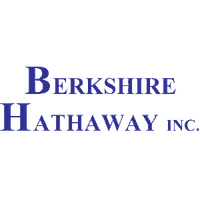
Berkshire Hathaway Inc
NYSE:BRK.B

Intrinsic Value
The intrinsic value of one
 BRK.B
stock under the Base Case scenario is
391.47
USD.
Compared to the current market price of 506.92 USD,
Berkshire Hathaway Inc
is
Overvalued by 23%.
BRK.B
stock under the Base Case scenario is
391.47
USD.
Compared to the current market price of 506.92 USD,
Berkshire Hathaway Inc
is
Overvalued by 23%.
The Intrinsic Value is calculated as the average of DCF and Relative values:

Valuation History
Berkshire Hathaway Inc

Fundamental Analysis

Succession uncertainty without Warren Buffett and Charlie Munger's guidance could erode investor confidence and diminish Berkshire's historical investment discipline, leading to suboptimal capital allocation decisions.
Berkshire’s massive insurance float provides a significant source of low-cost capital that can be reinvested in high-return opportunities, acting as a major driver of long-term earnings growth.

Revenue & Expenses Breakdown
Berkshire Hathaway Inc

Balance Sheet Decomposition
Berkshire Hathaway Inc

| Current Assets | 120.1B |
| Cash & Short-Term Investments | 47.7B |
| Receivables | 48.4B |
| Other Current Assets | 24B |
| Non-Current Assets | 1T |
| Long-Term Investments | 604.6B |
| PP&E | 222.9B |
| Intangibles | 119.7B |
| Other Non-Current Assets | 86.6B |
Free Cash Flow Analysis
Berkshire Hathaway Inc

| USD | |
| Free Cash Flow | USD |
Earnings Waterfall
Berkshire Hathaway Inc

|
Revenue
|
371.4B
USD
|
|
Cost of Revenue
|
-280.5B
USD
|
|
Gross Profit
|
90.9B
USD
|
|
Operating Expenses
|
-30B
USD
|
|
Operating Income
|
60.9B
USD
|
|
Other Expenses
|
28.1B
USD
|
|
Net Income
|
89B
USD
|
BRK.B Profitability Score
Profitability Due Diligence

Berkshire Hathaway Inc's profitability score is 52/100. The higher the profitability score, the more profitable the company is.

Score
Berkshire Hathaway Inc's profitability score is 52/100. The higher the profitability score, the more profitable the company is.
BRK.B Solvency Score
Solvency Due Diligence

Berkshire Hathaway Inc's solvency score is 59/100. The higher the solvency score, the more solvent the company is.

Score
Berkshire Hathaway Inc's solvency score is 59/100. The higher the solvency score, the more solvent the company is.
Wall St
Price Targets
BRK.B Price Targets Summary
Berkshire Hathaway Inc

According to Wall Street analysts, the average 1-year price target for
 BRK.B
is 529.35 USD
with a low forecast of 487.08 USD and a high forecast of 585.61 USD.
BRK.B
is 529.35 USD
with a low forecast of 487.08 USD and a high forecast of 585.61 USD.
Dividends

Current shareholder yield for  BRK.A is
.
BRK.A is
.
Shareholder yield represents the total return a company provides to its shareholders, calculated as the sum of dividend yield, buyback yield, and debt paydown yield. What is shareholder yield?

The intrinsic value of one
 BRK.B
stock under the Base Case scenario is
391.47
USD.
BRK.B
stock under the Base Case scenario is
391.47
USD.
Compared to the current market price of 506.92 USD,
 Berkshire Hathaway Inc
is
Overvalued by 23%.
Berkshire Hathaway Inc
is
Overvalued by 23%.




















































 You don't have any saved screeners yet
You don't have any saved screeners yet